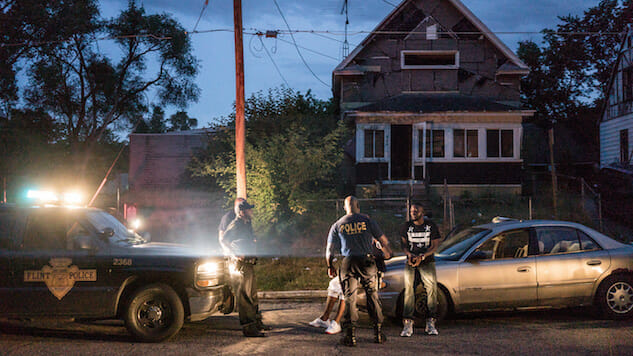Hi, Unoffical Official Cataclysm Documentary Correspondent here. I learned something this week, which is that I probably don’t have the necessary temperament to be a police officer in Flint, Michigan.
Netflix’s new docuseries, Flint Town, follows a handful of cops as they deal with a population badly afflicted by poverty, loss of job opportunity, a very high violent crime rate—oh, and poisonous drinking water. The series has its pluses and minuses, but it’s something you might consider taking a look at for a really good example of what happens when law enforcement cannot maintain the trust of the population they are supposed to be protecting. There are a lot of questions raised that no one seems remotely able to answer.
Flint has 300,000 citizens and fewer than a hundred cops, whose budgets are constantly imperiled. So 911 calls sometimes don’t get answered until, like, the next day, which is not helpful when you’ve been robbed. Or shot at. So, when voting day comes around and there’s a tax increase for law enforcement on the ballot, people understandably say, “Why bother?” The city has trouble recruiting police officers. Flint is crumbling, with entire residential blocks vacant, significant food deserts (apparently a lot of people get most of their groceries from a liquor store that’s frequently in trouble with the police for sketchy dealings) and a high rate of gun violence. There’s racial tension, but there’s also just a seething hatred of cops. In one amazing sequence, an enraged woman who’s escalated a multi-officer situation snarls that they can’t be trusted because they’re all white; what’s remarkable about it is that she says this while staring directly at half a dozen cops, of whom almost all are black residents of Flint: I think it’s safe to say there’s a counterproductively high level of reactivity going on. Basically, a lot of stuff is broken and no one seems to have the resources to fix anything.
The series follows a handful of police officers in the months following the election of Mayor Karen Weaver and her appointment of a new police chief, who seeks to reduce crime by implementing a “target team” to proactively enter high-crime areas looking to stop violent incidents before they start. It’s somewhat successful in lowering the violent crime stats, but it’s clear that the root cause of the problem is that Flint is a poverty-ridden city without much reason for hope.
What’s less than stellar about this series is, basically, the editing. There’s seriously just a hell of a lot of footage that isn’t very compelling, though a case could be made for this as an artistic decision to underscore the relentless dreariness these folks are dealing with—I’m just not making that case; it feels padded. Some of the officers we track are a lot more interesting than others. Sometimes there are deviations into their off-duty lives that are revealing and thought-provoking, and sometimes they just feel like deviations. And the water crisis, while it’s referred to many times and is certainly a looming, horrible issue for the city, doesn’t have bupkiss to do with the police force—at least not in Flint Town. We’re set up to expect some kind of “Here’s what the water crisis is doing to the local law enforcement personnel,” or “Here’s what Flint police are doing or not doing about the water problem,” but we get neither. Just reminders that the water is still full of lead.
So that’s the less-good part. What’s great about Flint Town is its really impartial stance and dedication to documenting what is in a non-judgmental way. Cops aren’t all heroes and they aren’t all violent, racist power-abusers. Government isn’t squeaky-clean and it also isn’t wall-to-wall self-serving rat-bastards. The community these people are struggling to serve aren’t presented as a good guy/bad guy dichotomy. We see citizens doing good things and stupid things. We see cops helping and cops screwing up. We see people who are exhausted and afraid and in pain and without resources, most of whom are probably doing the best they can at any given time even if that’s sometimes not entirely adequate.
Flint Town doesn’t really set out to answer a question. In fact, it really doesn’t directly ask one, but it implies a couple of big ones. How does one save a dying city? How can policing change in communities where violence by police and violence against police are both significant problems? How do we maintain dignity, empathy, and justice when there is no trust left? How do you restore trust in a world rife with corruption? How do you end corruption in a dying city? You see what I mean? The “why” questions here aren’t even questions; the answer to all of them is “poverty and loss of hope for improvement.” The how questions? Flint might be the canary in that coal mine as one of the poorest cities in the nation, but every one of us has to start looking for those answers.
Flint Town premieres Friday, March 2 on Netflix.
Amy Glynn is a poet, essayist and fiction writer who really likes that you can multi-task by reviewing television and glasses of Cabernet simultaneously. She lives in the San Francisco Bay Area.